Prevention is better than the cure: April is heartworm awareness month
Published 2:57 pm Friday, April 2, 2021

- Ruth Olsen and Smiles, a Humane Society resident who is being treated for heartworms
|
Getting your Trinity Audio player ready...
|
Ruth Olsen is the Operational Manager for the Sumter Humane Society. She provides a healthy home for the pets of Sumter County. As part of providing a healthy home, she wants the residents to know there is one simple act of kindness that could extend the life of a pet by 5 to 10 years. Ruth reports heartworms, primarily in dogs, have become an “epidemic.” A little over 25% of the dogs she meets are infected. Heartworms can cause a horrible death for a dog. It is Ruth’s hope if folks are aware of how simple prevention is, an investment can be made which will extend the quality of life for our animal friends. Local vet, Dr. Kyler Crawford, also agrees with Ruth, “an ounce of prevention is worth a pound of cure.” Ruth and Kyler describe the effects of heartworms as being detrimental to both the animal and the folks who love them.
A dog acquires heartworms through mosquitoes. In the south, the problem is prevalent. When an affected mosquito bites a dog, it injects the heartworm into the dog. As Ruth describes the process, “the larvae dig into the heart, get to adult stage and then begin to lay babies so it keeps multiplying. Eventually the heart fills up with so many of the worms it can’t even beat anymore. The lungs will fill up with fluid and it’s a horrible, horrible death.” Kyler adds that the first symptoms of the infestation is typically a “non-productive mild cough and lowered stamina.” However, as the disease progresses the dog will begin to bloat and become more and more limited in their ability to be active. Treatment for the animal can take over 3 months and cost anywhere from $500–$900. In addition to the cost and length of care for the dog, the dog must also be watched and limited in his movement. As with most diseases the earlier a dog gets treated, the better the chance his quality of life can be maintained. Once the heart is damaged, there is no repairing it, so treatment in the early stages gives the dog the best chance of recovering.
However, better than recovering is never being infected in the first place. Kyler reports heartworm prevention has changed over the years. Earlier, the only option was a pill which had to administered to the dog once a month. However, even with best of intentions, owners can forget to give the pill which puts the pet in jeopardy when the effectiveness runs out. Today, vets can offer an injection that can last 6 months to a year. Often, there is a thought a vet visit can be too expensive to provide such basic medical care. Ruth and Kyler indicate it cost less than $100 a year to prevent heartworms. The cost to treat heartworms is between $500 and $900 per treatment. If the dog hasn’t received his prevention the same dog could require treatment over and again. Ruth reports she spends better than $500 in treatment for one in every four dogs who come into the shelter.
The cost to the shelter is significant. The cost to the dog is significant. The cost to the dog owner is significant. However, the prevention is a little time and a little more than a quarter a day. Ruth is hopeful she will begin to see fewer dogs suffering from the condition if folks will invest in the prevention. Heartworms is a costly condition for the Humane Society as monies wrapped up in treating heartworms are monies that will decrease her capacity to provide homes and services to other animals. This could not come at a worst time. The Humane Society is seeing their funding and their grant possibilities dry up secondary to COVID-19. Additionally, they are not able to do their typical fund-raising events due to the virus. Ruth and her animal friends need our community to show their trademark generosity to the shelter. Donations of supplies and food are welcome. Financial gifts allow the greatest possibility to meet a need of the shelter. Ruth reports if a donor would like to specifically help in the treating or preventing heartworms, their funds can be designated to do so. To donate, speak with Ruth or find out more about the Humane Society, please visit their website at sumterhumanesociety.org, call 229.924.0268 or visit them at 108 Industrial Blvd. To contact Dr. Kyler Crawford, find him at Americus Veterinary Hospital, 1037 Fetner Street, call 229.924.6146 or visit www.americusveterinaryhospital.com






